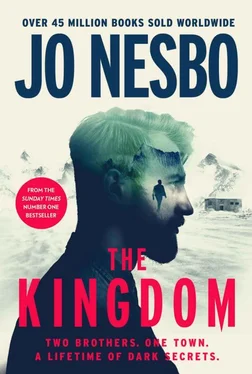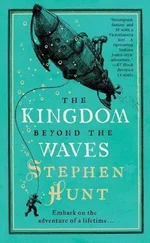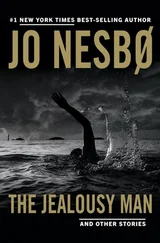Carl had been given the middle name Abel, after Secretary of State Abel Parker Upshur, an intelligent and charming man, according to Dad, as well as a man who dreamed big. So big that he arranged the annexation of Texas to the USA in 1845 and in so doing made it in one night a much bigger country. As part of the deal Abel accepted that Texas could continue with slavery. But under the circumstances that was, according to Dad, a mere detail.
It could be that Carl and I matched pretty well the two we were named for. No one in the village – apart from maybe the old chairman Aas – knew anything about the original Calvin and Abel. They just said that I was most like Dad, and Carl most like Mum. But people down in Os don’t know what they’re talking about, they just talk.
I was ten years old the time Dad came driving home in a Cadillac DeVille. Willum Willumsen at Willumsen’s Used Car and Breaker’s Yard had boasted about this beautiful specimen the owner had imported from the USA but found he couldn’t afford the import duty and had had to sell. In other words the car, a 1979 model, had done nothing but drive along dead straight highways through bone-dry Nevada deserts, so no rust to worry about there. Dad probably nodded his head slowly. He hadn’t a clue about cars, and my own interest still lay in the future. He made the deal without even haggling over the price, and after it had to be taken back to the repair shop less than two weeks later it was obvious it had as many pirated parts and faults as any of those wrecks you see balanced on breeze blocks on the streets of Havana. In the end the repairs set him back more than the car had. The locals laughed themselves silly about it and said that was what you get for not knowing the first thing about cars, one up for Willumsen, that wily old horse-trader. But I got a new toy. No, it was more than that, it was an education. A gadget in a thousand mechanical pieces, from which I learned that if you just took the time to understand the construction, and used your brain and your fingers then it was actually possible to mend things.
I started spending more time at Uncle Bernard’s car repair shop. He allowed me to ‘help him out’, as he put it, though to begin with I was more of a hindrance than a help. And Dad taught me to box. Around that time Carl is a little hazy for me. This was before he shot up. At first it looked as though I was going to be the taller of us, and for a while back then he had some terrible pimples. He did well at school, but he was quiet, had few friends, and kept himself to himself most of the time. And once he started at secondary school and I was spending more and more time at the repair shop it was often bedtime before we saw each other.
I remember one evening talking about how much I was looking forward to turning eighteen, coming of age, getting a driving licence, and Ma shed a little tear and asked if the only thing I thought about was jumping into the car and getting away from Opgard.
And of course, looking back, it’s easy to say that would have been best. But things had already started falling apart, and I couldn’t just run off. I had to fix them. Repair them. Anyway: where would I go?
Then came the day Mum and Dad died, and Carl is back in all of those memory-pictures. I was almost eighteen, him not yet seventeen. Him and me sit watching as the Cadillac heads away from the yard and down in the direction of Geitesvingen. Even now it’s still like a film I can watch and discover new details in every time.
Two tons of machinery from the General Motors factory, rolling along and gradually gathering speed. Now it’s so far away from me I can no longer hear the gravel crunch beneath the tyres. Silence, silence and the red rear lights. I can feel my heart beating, the speed increasing there too. Another twenty metres to Geitesvingen. The Highways Maintenance Department had been on the point of erecting a crash barrier when the council discovered that the last hundred metres up to the farm were private road and Opgard’s responsibility. Ten metres to go. The brake lights – like two bars, two hyphens running between the lid of the boot and the shiny bumper bar – lit up for a moment. Then they were gone. Everything was gone.
‘NOW LET’S SEE, ROY. YOU were standing outside the house on the evening of the accident at half past…’ Sheriff Sigmund Olsen sat with his head bent as he looked through the documents. His thick mane of blond hair made me think of the mop in the gym at school. The hair hanging down was the same length at the front, the sides and the back. He had one of those thick walrus moustaches too, probably had the mop and the moustache ever since the seventies. Because he could. There wasn’t a trace of baldness on his bent head. ‘…seven. And you saw your parents go over the edge?’
I nodded.
‘And you say you saw the brake lights go on?’
‘Yes.’
‘You’re sure it wasn’t just the rear lights? You know they’re both red?’
‘The brake lights are brighter.’
He looked up at me quickly.
‘You’ll soon be eighteen, right?’
I nodded again. Maybe it was in his papers, maybe he remembered I’d been a class ahead of his son Kurt at junior school.
‘Secondary school?’
‘I work at my uncle’s car repair shop.’
The sheriff bent over the desk again. ‘Good, then you’ll understand why we think it’s odd we didn’t find any skid marks. And even if the blood test shows your Dad had had a drink, it was hardly enough for him to forget about the bend, or put his foot down on the wrong pedal, or fall asleep at the wheel.’
I said nothing. He’d dispensed with three possible explanations in one blow. And I didn’t have a fourth to offer.
‘Carl told us you were going to visit your uncle Bernard Opgard at the hospital. That’s who you work for?’
‘Yes.’
‘But we’ve talked to Bernard, and he says he never heard about any planned visit. Did your parents usually make unannounced visits?’
‘No,’ I said. ‘And not announced ones either.’
The sheriff nodded slowly. Again he studied his papers. Seemed like that’s what he was most comfortable doing. ‘Was your father depressed, do you think?’
‘No,’ I said.
‘You sure? Other people we’ve talked to thought he seemed very down.’
‘You want me to say he was depressed?’
Olsen raised his eyes again. ‘Now what do you mean by that, Roy?’
‘That maybe that would make the case simpler. If you can say he killed himself and my mum.’
‘Why do you think that makes it simpler?’
‘No one liked him.’
‘That’s not true, Roy.’
I shrugged. ‘OK then, I’m sure he was depressed. He spent a lot of time alone. Sat most of the time inside the house and didn’t talk much there either. Drank beer. That’s what depressed people do.’
‘People who suffer from depression can be very clever at hiding it.’ Sheriff Olsen’s gaze worked to hold mine, and once he’d managed it, he had a job keeping it steady. ‘Did your father ever say anything about… about not liking being alive?’
Not liking being alive. Once he’d said the words, it was as though Sigmund Olsen had got over the worst of it. His gaze rested calmly on me.
‘Who the hell likes being alive?’ I asked.
For a moment Olsen looked shocked. He put his head on one side and his long hippy hair dangled down on his shoulder. Maybe it was a mop. I knew that hidden behind the desk he had an enormous belt buckle with a white buffalo skull on it and a pair of snakeskin boots. We dress ourselves in death.
‘Why live if you don’t like it, Roy?’
‘Isn’t it obvious?’
‘Is it?’
‘Because being dead may be even worse.’
Читать дальше












